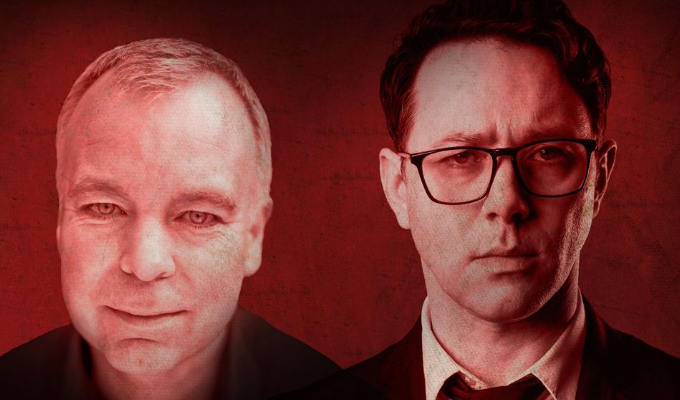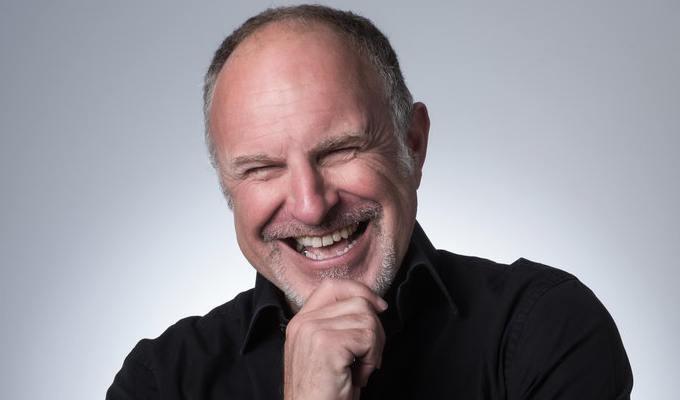Stand-Up Or Die by Andy De La Tour
Book review by Steve Bennett
Andy De La Tour deserves a noble place in the history of stand-up. He was one of the fringe theatre performers who were there at the foundation of Alternative Cabaret as the Seventies turned into the Eighties, alongside the likes of Alexei Sayle and Tony Allen. He and took the political foundations of that movement very seriously, too: playing republican gigs in Troubles-scarred Belfast and sparking a fight in the early days of the Comedy Store when his comments about Auschwitz didn’t go down to well with the skinhead racists in the room.
He went on to perform an Edinburgh show with Ben Elton; appear in all the hip comedy shows of the day from The Young One to Bottom to Saturday Live; and support Rik Mayall on tour. But on March 14, 1990, when those 100 support dates were over, he decided to retire from stand-up and never trod a comedy club stage again.
...Until 2010, that is. When on a whim he decided he had to travel to New York for a 90 days (the most allowed under a tourist visa) to see if it still held the same allure it had on an earlier visit.
‘I know that the stand-up comedy scene in the UK has long since shed its chaotic, vaguely radical, origins,’ he writes. ‘But I was curious to discover if the present generation of New York stand-ups had retained some of the political awareness and comic “edge” that identified many of the comedians I had seen on my US trip back in 1982.’
Spoiler alert: The answer is pretty much ‘no’.
His unique standpoint comes because his view of the comedy circuit has been frozen in aspic for three decades. In going to New York, he will see instantly what’s changed over that time, without trying to observe the slow creep of evolution.
The first thing that stuck him was the size of the open mic circuit – and the grim realities of what it took to even get a gig on the bottom rung of the ladder at which he now stood. It’s a netherworld where maybe 5,000 hopefuls hawking themselves around tiny rooms, sometimes several in a night, or audition for slots at such ill-attended nights in front of their peers.
Why do these people put themselves through it? De La Tour asks. ‘Maybe they do it for fun. But standing at a mic in a dark room to an audience of twelve people who don’t laugh because they want you to fail may be a lot of things, but fun isn’t one of them. They do it... to try to live the comedy dream. And if the experience is embarrassing or humiliating, so what?’
As De La Tour charts his progress through the levels to get in front of even a small, appreciative audience, he flashes back to some memories from his own time on the circuit, from trying to follow Robin Williams to performing as Mayall’s support. Plus we get brief travelogues about some of the sights – and public transportation routes – of the Big Apple.
On stage, he’s rusty, so even doing a short set offers challenges, but he quickly learns what works and what doesn’t; how to arrange the material and what makes audiences squirm, and so offers an insights into the nuts and bolts of comedy.
Some of the names he encounters in New York might be familiar to UK readers: Hannibal Burress, Kristen Schaal, Eddie Brill (David Letterman’s one-time talent booker) and Lewis Black. But this is not about name-dropping, but how the live scene works there.
The most notable thing he observes is that few comics are tackling overtly political material – despite a ferocious divide between left and right in American politics. Or perhaps because of it. Why would anyone trying to crack the business of comedy want to alienate half the potential marketplace?
After a short cul-de-sac when De La Tour inadvertently finds himself doing a routine similar to one of Bill Hicks’s, he starts to include some political material in his set, especially inspired by 9/11. In the grand scheme of things, it’s relatively tame, though insightful, yet to those New Yorkers expecting the usual diet of off-the-peg observational comedy or low-level racism that’s usually served up in many of the clubs might have got a surprise.
By the end – and a couple of return transatlantic trips - De La Tour figures out a decent set that’s saying something. But that’s all he wants. He’s not seeking to rebuild a stand-up career in the States – and the fact he’s not trying to prove anything to anyone but himself means he can be honest about what he sees. So far gone from the UK scene, he doesn’t draw many parallels out between the current New York open-mic scene and what’s going on in London, but there are more similarities than he might think.
This is a brief book, just 96 pages, and could basically be considered an extended version of a Chortle Correspondents piece, bemoaning the state of the lower echelons of the circuit and the sameiness of so many acts. But De La Tour nails the problems exactly, and with some authority – while the book maintains a brisk, entertaining read. And the electronic version is so cheap, anyone with interest in the workings of the live comedy circuit would be a fool not to get it.
- Stand-Up or Die was released on Friday in paperback by Oberon Books. Click here to buy for £7.19 from Amazon – or for just £1.03 the Kindle version.
Published: 5 Feb 2013






